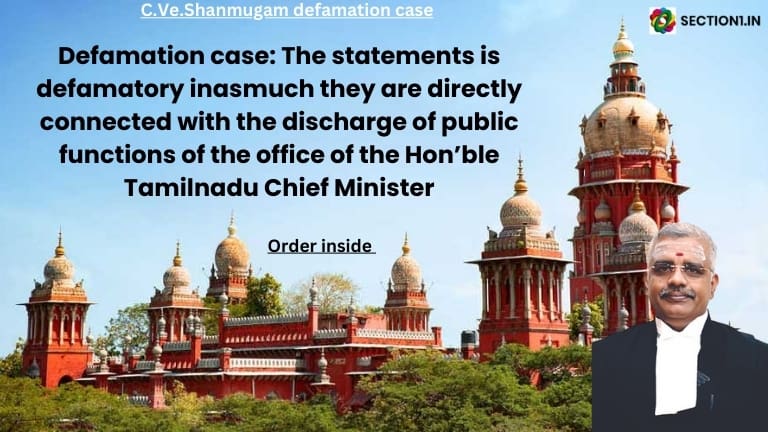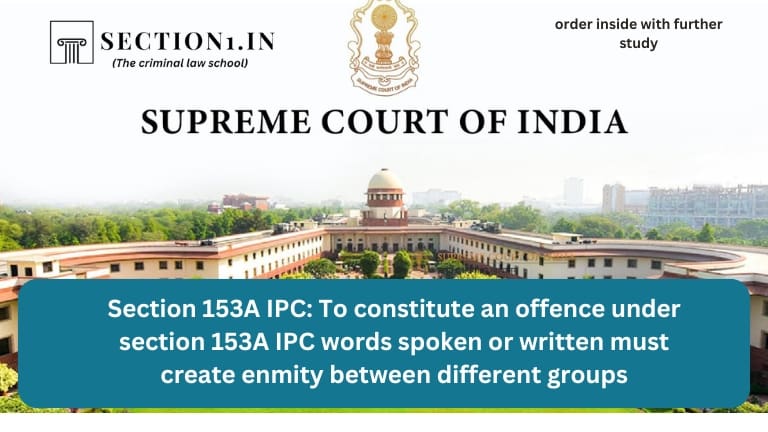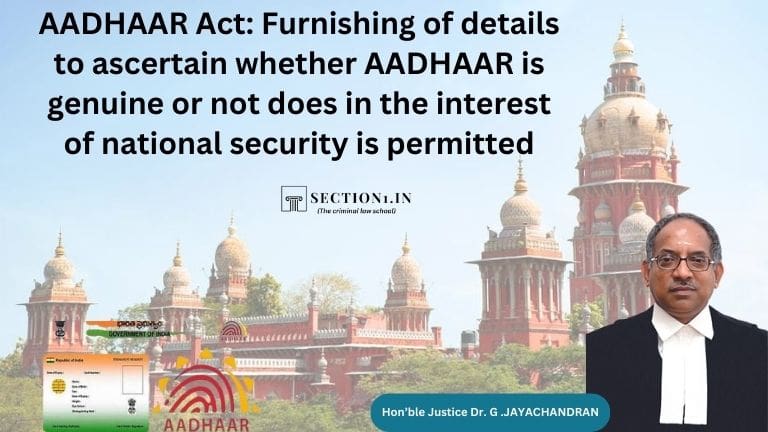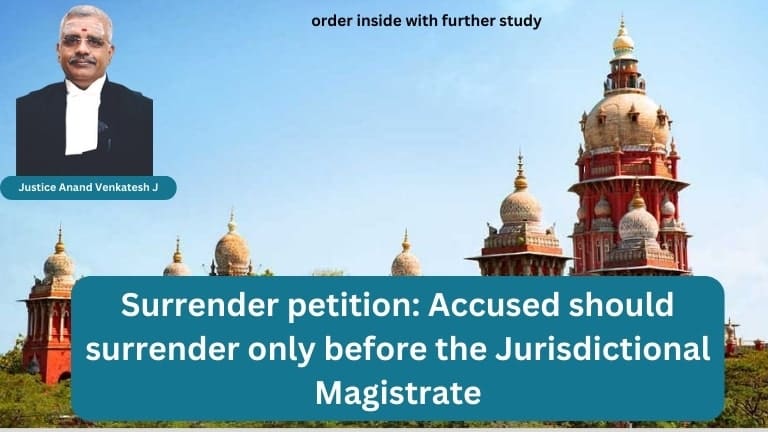Prayer
Petitions under Article 226 of The Constitution of India praying for the issuance of Writs of Certiorari to call for the records pertaining to G.O.Ms.Nos.573, 574, 748 & 537 of 2023 respectively dated 26.9.2023, 02.9.2023, 30.11.2023 and 02.9.2023 passed by the first respondent and the consequential complaints respectively in C.C. Nos. 3, 2, 4 & 1 of 2023 on the file of the learned Principal Sessions Court, Villupuram.
Common issues in all the writ petitions
The issues involved in all these writ petitions are common. Hence, the basic issues raised will be answered and applied to the facts of each case and the writ petitions are disposed of by this common order.
Case is regarding defamation
2.These writ petitions have been filed challenging the respective Government Orders passed by the first respondent according sanction to the Public Prosecutor for making complaints under Sub-Section (2) of Section 199 of the Criminal Procedure Code (for short, the Code) against the petitioner for the alleged defamatory speech made against the Hon’ble Chief Minister, which constitutes an offence under Section 499 of the Indian Penal Code (for brevity, the IPC), punishable under Section 500 of the IPC and the consequential complaints filed before the learned Principal Sessions Judge, Villupuram, which have been taken cognizance and in which, summons have been issued to the petitioner.
Arguments on behalf of the petitioner
4.The learned Senior Counsel appearing on behalf of the petitioner submitted that the impugned Government Orders have been issued without any application of mind and are, per se, arbitrary and illegal. He further submitted that the petitioner, as a member belonging to the opposition party, criticized the Government headed by the Chief Minister on certain important issues, that such criticism cannot be prevented by initiating defamation cases and that it will tantamount to throttling the voice of the opposition. He also submitted that there is absolutely no nexus in the statements made by the petitioner with the discharge of public functions/official duties of the Hon’ble Chief Minister and that therefore, the requirements under Sections 199(2) and 199(4) of the Code have not been fulfilled.
The petitioner’s Senior Counsel argued that the government orders are arbitrary and illegal, and that he, as an opposition member, cannot prevent criticism by initiating defamation cases. He also argued that the petitioner’s statements do not align with the Chief Minister’s public functions, thus violating Code requirements.
Judgments relied by the counsel for the petitioner
5.In order to substantiate the above submissions, the learned Senior Counsel appearing on behalf of the petitioner relied upon
(i) the judgment of the Apex Court in the case of K.K.Mishra Vs. State of Madhya Pradesh [reported in 2018 (6) SCC 676]; and
(ii) the judgment of a learned Single Judge of this Court in the case of Thiru N.Ram, Editor in Chief, Printer & Publisher ‘The Hindu’ Kasturi & Sons Ltd. Vs. Union of India rep.by its Secretary to Government, Ministry of Law & Company Affairs [reported in 2020 SCC On-Line Madras 1023]
Arguments on the side of the Government
6.Per contra, the learned Advocate General appearing on behalf of the respondents submitted that in each Government Order that was issued, the first respondent has taken into account the material placed by the Inspector General of Police, Intelligence, SBCID, Chennai and found that it contained imputations, which are, per se, defamatory against the Hon’ble Chief Minister in the discharge of his public functions, that the same is clearly reflected in the respective Government Orders themselves and that there is absolutely no ground to interfere with the impugned Government Orders.
Analysis of the Hon’ble Madras High court
8.This Court has carefully considered the submissions made by the learned counsel on either side and perused the materials available on record.
Issues for consideration
9.The following issues arise for consideration in these writ petitions :
(a) Whether the respective Government Order issued in each case suffers from non application of mind and hence, the respective sanction accorded through the impugned Government Orders is liable to be interfered by this Court?
(b) Whether the allegations/imputations made by the petitioner are defamatory? and
(c) Whether there is a direct and reasonable nexus between those defamatory statements in the discharge of public functions of the Hon’ble Chief Minister?
Special Procedure for initiation of prosecution for defamation
11.A careful reading of the said judgment of the Apex Court [K.K.Mishra Vs. State of Madhya Pradesh [reported in 2018 (6) SCC 676]] shows that Section 199(2) of the Code carves out a special procedure with regard to initiation of a prosecution for the offence of defamation committed against a public servant/constitutional functionary. To initiate such a complaint on behalf of a public servant/constitutional functionary, there must be a valid sanction of the Competent Authority under Section 199(4) of the Code. Therefore, Sections 199(2) and 199(4) of the Code envisage a departure from the normal procedure that is followed for initiation of a complaint before the Magistrate by an aggrieved person alleging the offence of defamation. The Apex Court, in the said judgment, observed that the problem of correlation of the acts, which are allegedly defamatory and those connected with the discharge of public functions of the public servant/constitutional functionary, is, by no means, an easy task. The Apex Court has cautioned that the Court must carefully look into the allegations/ imputations and see if they have any nexus with the discharge of public duties by the public servant/constitutional functionary and only then, the complaint filed by the Public Prosecutor on behalf of the public servant/constitutional functionary is maintainable.
Mandatory four step process to permit the private prosecution under section 199 (2) crpc
12.There is a four step process, which should be adopted in a case of this nature and they are:
(a) Whether the offence of defamation has been committed against the public servant/constitutional functionary?
(b) Whether a proper sanction has been accorded by the Competent Authority under Section 199 (4) of the Code?
(c) Whether the statements/imputations made constitute defamation as defined under Section 499 of the IPC? and
(d) Whether the defamatory statement has a direct and reasonable nexus with the discharge of public functions of the public servant/constitutional functionary.
13.Only if all the above four steps are complied with, the private complaint instituted under Section 199(2) of the Code can be permitted to be proceeded further.
No format for sanction order but application of mind is necessary
15.It must be borne in mind that a sanction accorded by the Competent Authority need not be in the form of an order or a judgment passed by a court. The only requirement is to see if the sanction order reflects application of mind. To test such application of mind, the sanction order must state as to what material was relied upon to come to a conclusion to accord sanction under Section 199(4) of the Code. It is not necessary for the Sanctioning Authority to extract all the imputations in the sanction order and specifically connect it with the discharge of public functions of the public servant/constitutional functionary. If that requirement is imposed, it will virtually amount to passing an order or a judgment and such an onerous task is not contemplated under Section 199(4) of the Code.
Sanctioning order was granted with proper application of mind
16.In each of the Government Orders, the first respondent placed reliance upon the individual letters received from the Inspector General of Police, Intelligence, SBCID, Chennai. These letters specifically provided the imputations/statements made by the petitioner. Hence, there was a material placed before the first respondent to go through the same and to take a decision to accord sanction to the Public Prosecutor for making the complaints under Section 199(2) of the Code. The Government Orders that have been put to challenge in all these writ petitions, fulfil the requirement of application of mind on the part of the first respondent and this Court does not find any ground to interfere with the impugned Government Orders.
Court must consider only the reasons assigned in the sanction order
17.While testing an order, the reasons assigned in the order alone must be taken into consideration by the Court. The Court cannot assume the position of the Authority to justify the order and the Court has to understand the purport of an order only based on what is found in the order in terms of reasoning. It is also too well settled that an order cannot be improved by way of filing an affidavit and the order has to be tested only based on what is contained in the order.
Respondent applied his mind while issuing government order
18.While applying the above principles, this Court finds that the first respondent applied his mind while issuing the respective Government Orders based on the materials available in terms of the respective letters of the Inspector General of Police, Intelligence, SBCID. In view of the same, there is no ground made out for interfering with the impugned Government Orders, which accorded sanction to the Public Prosecutor to make complaints under Section 199(2) of the Code. The alleged imputations have been made against the Hon’ble Chief Minister. There cannot be any quarrel with the fact that the Hon’ble Chief Minister is a Constitutional Functionary and therefore, this requirement is also fulfilled in all these cases.
Whether the statements made is defamatory?
19.The other two requirements that have to be tested in these writ petitions are:
(i) whether the imputations/statements are defamatory? and
(ii) whether such defamatory statements are attributable or connected with the discharge of public functions of the office of the Hon’ble Chief Minister.
20.In order to deal with the said two requirements as contained in paragraph 19, this Court has to necessarily go into the allegations made in each of the complaints that have been put to challenge.
The statements is defamatory inasmuch they are directly connected with the discharge of public functions of the office of the Hon’ble Tamilnadu Chief Minister
23.It is not necessary for this Court to translate each of the allegations that have been extracted except to cull out the core imputations/statements. The statements made are obviously defamatory since they will harm the reputation and character of the person concerned in the estimation of others. The imputations/ statements have been made by clearly mentioning the name of the Hon’ble Chief Minister, who is heading the Government and therefore, even assuming that he is not holding the concerned portfolio, as the Chief Minister is the Head of the Executive, he is responsible for the functioning of every department in the State. Hence, those imputations made by the petitioner are directly attributable or connected with the discharge of public functions of the office of the Hon’ble Chief Minister.
Conclusion
24.The above findings rendered by this Court are only prima facie findings and this Court holds that the other two requirements are also fulfilled in this case. Therefore, there is no ground to interfere with the complaint that is pending in C.C.No.3 of 2023 on the file of the Principal Sessions Court, Villupuram. It is left open to the petitioner to raise all his defence in this complaint. Accordingly, W.P.No.879 of 2024 is liable to be dismissed.
36.In the result,
(i) W.P.Nos.879 and 882 of 2024 stand dismissed. Consequently, WMP.Nos.907, 910, 911, 912 & 913 of 2024 are also dismissed; and
(ii) W.P.Nos.884 and 887 of 2024 stand allowed. Though this Court does not find any ground to interfere with the respective Government Orders namely G.O.Ms.No.748 dated 30.11.2023 and G.O.Ms.No.537 dated 02.9.2023, to that extent, the proceedings respectively in C.C.Nos.4 and 1 of 2023 on the file of the Principal Sessions Court, Villupuram are hereby quashed. Consequently, WMP. Nos.914 to 916, 918 & 919 of 2024 are closed.
Party
C.Ve.Shanmugam, B.A., B.L., Member of Parliament, Villupuram-1 vs. 1.The State of Tamil Nadu, rep. by the Secretary to Government, Public (Law & Order-H) Department, Secretariat, Fort St.George, Chennai-9. 2.The Public Prosecutor, Villupuram District & Sessions Court, Villupuram – Writ Petition Nos.879, 882, 884 & 887 of 2024 & WMP.Nos.907, 910 to 916, 918 & 919 of 2024 – 24.1.2024 – The Honourable Mr.Justice N.ANAND VENKATESH
https://mhc.tn.gov.in/judis/index.php/casestatus/viewpdf/1097837







2 Comments
[…] Defamation case: The statements is defamatory inasmuch they are directly connected with the discharg… […]
[…] Defamation case: The statements is defamatory inasmuch they are directly connected with the discharg… […]